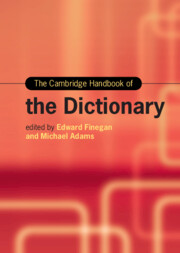Book contents
- The Cambridge Handbook of the Dictionary
- Cambridge Handbooks in Language and Linguistics
- The Cambridge Handbook of the Dictionary
- Copyright page
- Contents
- Figures
- Tables
- Contributors
- Acknowledgments
- Introduction
- Part I Types of Dictionaries
- Part II Dictionaries as Books
- Part III Dictionaries and Ideology
- Part IV Dictionaries and Domains of Use
- Chapter 20 Dictionary Audiences
- Chapter 21 Dictionaries and Intellectual History
- Chapter 22 Dictionaries and Social History
- Chapter 23 Linguistics and Philology in Dictionaries
- Chapter 24 Dictionaries as Literary Artifacts
- Chapter 25 Dictionaries and Editors
- Chapter 26 Lexicography and the Law
- Part V The Business of Dictionaries
- Part VI The Future of Dictionaries
- References: Dictionaries
- References: Secondary Works
- Index
Chapter 23 - Linguistics and Philology in Dictionaries
from Part IV - Dictionaries and Domains of Use
Published online by Cambridge University Press: 19 October 2024
- The Cambridge Handbook of the Dictionary
- Cambridge Handbooks in Language and Linguistics
- The Cambridge Handbook of the Dictionary
- Copyright page
- Contents
- Figures
- Tables
- Contributors
- Acknowledgments
- Introduction
- Part I Types of Dictionaries
- Part II Dictionaries as Books
- Part III Dictionaries and Ideology
- Part IV Dictionaries and Domains of Use
- Chapter 20 Dictionary Audiences
- Chapter 21 Dictionaries and Intellectual History
- Chapter 22 Dictionaries and Social History
- Chapter 23 Linguistics and Philology in Dictionaries
- Chapter 24 Dictionaries as Literary Artifacts
- Chapter 25 Dictionaries and Editors
- Chapter 26 Lexicography and the Law
- Part V The Business of Dictionaries
- Part VI The Future of Dictionaries
- References: Dictionaries
- References: Secondary Works
- Index
Summary
The terms linguistics and philology refer to different but overlapping areas of the Humanities. An opposition between them does not predate the triumph of structuralism. Structuralist linguistics devoted itself mainly to synchrony and theory, with lexicology and lexicography ending up in no-man’s land. A detailed look at dictionary definitions of linguistics and philology for more than three centuries offers a picture of the goals of both disciplines and of the ways the public understood language studies. Before the twentieth century, the focus of philology was the interpretation of old texts and word origins. The treatment of special terminology (including the terminology of linguistics) in dictionaries shows that despite all the differences a clear line between linguistics and philology cannot and need not be drawn, just as such a line cannot always be drawn between a dictionary and an encyclopedia. In the context of the present study, the use of etymology and phonetic transcription in various dictionaries illuminates the difference between and the unity of philology and linguistics.
Keywords
- Type
- Chapter
- Information
- The Cambridge Handbook of the Dictionary , pp. 460 - 480Publisher: Cambridge University PressPrint publication year: 2024

